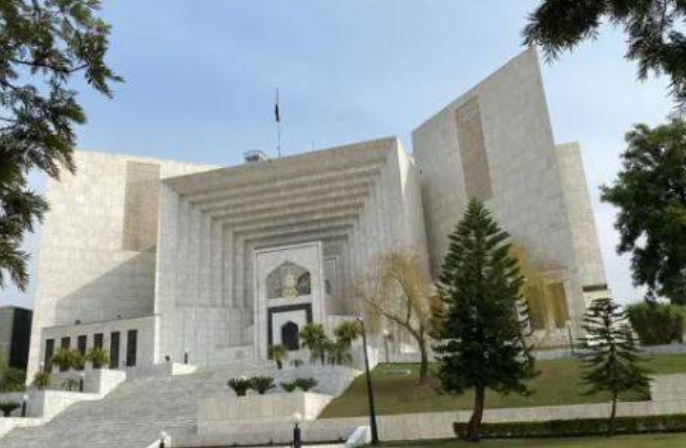Islamabad (Web Desk): The newly formed constitutional bench of the Supreme Court (SC) on Thursday began hearing a significant number of long-pending cases, as part of efforts to address the growing backlog in the judiciary.
The six-member constitutional bench, led by Justice Amin-ud-Din Khan and comprising Justice Jamal Khan Mandokhail, Justice Muhammad Ali Mazhar, Justice Syed Hasan Azhar Rizvi, Justice Musarrat Hilali, and Justice Naeem Akhtar Afghan, is working through a series of high-profile cases, with the aim of clearing up old matters and ensuring timely justice for petitioners.
The bench, formed under the 26th Constitutional Amendment, will hear a total of 34 cases over two days, with 18 cases scheduled for the first day and the remaining 16 for the following day.
Among the cases being considered are longstanding environmental issues, some of which have been in the courts since 1993.
The bench is particularly focused on the rampant pollution and environmental degradation in the country, which has become a major concern for many of the justices.
During the proceedings, Justice Jamal Khan Mandokhail pointed out that the environmental challenges extend beyond just Islamabad, noting the severe pollution in other parts of the country, especially caused by vehicle emissions.
He also raised the issue of the increasing construction of housing societies, questioning whether enough measures are being taken to curb the damage to farmland and natural resources.
Justice Musarrat Hilali echoed concerns about the proliferation of housing developments, observing that entire agricultural areas are being destroyed to make way for new residential schemes.
She further criticized the slow-moving actions of the Environmental Protection Agency, suggesting that its officers rarely leave their offices and that, despite the agency's oversight, housing societies continue to expand without proper regulation.
Justice Hilali also brought attention to the pollution caused by industries such as poultry farms and marble factories, with particular reference to the environmental damage in cities like Mansehra and Swat.
Justice Naeem Akhtar Afghan expressed alarm at the growing replacement of agricultural land with housing projects, noting that pollution levels in Lahore and Islamabad are now spilling over into neighboring areas.
He argued that the country needs to adopt alternative forms of urban development, such as promoting flats rather than sprawling housing societies, to prevent further loss of fertile land.
The bench has called for reports from all provinces on their efforts to tackle environmental pollution, and has postponed the hearing for three weeks to allow for further submissions from the relevant authorities.
In addition to environmental cases, the bench also addressed a variety of petitions related to the conduct of public officeholders and the upcoming general elections.
Among the cases dismissed was a petition seeking to prevent government employees from marrying foreign nationals, with the bench imposing a fine of Rs 20,000 on the petitioner for submitting an unreasonable request.
Similarly, a case calling for the disqualification of lawmakers with foreign assets or bank accounts was also dismissed, with the justices noting that such matters fall under the jurisdiction of Parliament, not the judiciary.
A petition asking the court to intervene in the scheduling of the 2024 general elections was dismissed as well, with the bench observing that the election process is already underway and that the petition had become irrelevant.
In another case, the bench disposed of petitions related to judicial appointments, including a review petition concerning the nomination of Justice Qazi Faez Isa as Chief Justice of the Balochistan High Court.
Throughout the hearings, the bench stressed the importance of respecting the separation of powers between the legislature and the judiciary.
The judges pointed out that many of the issues being raised, such as the regulation of foreign assets or the personal choices of government employees, should be dealt with by the elected Parliament rather than the courts. In some instances, the bench even suggested that petitioners take their concerns to lawmakers for legislative solutions.
The top court’s constitutional bench has made it clear that it will continue to focus on clearing old cases, but also emphasized that many of the issues being raised are outside its scope and should be addressed by other institutions, particularly Parliament.
As part of its broader efforts to streamline the judicial process, the bench has also imposed fines on petitioners who submit cases deemed frivolous or without merit, in an attempt to discourage unnecessary delays and procedural obstructions.


